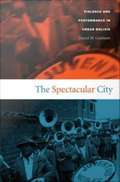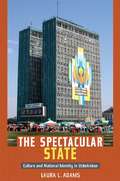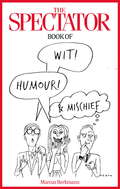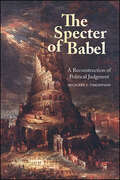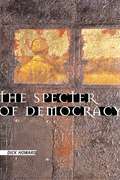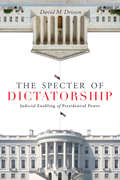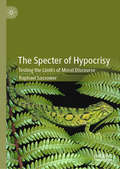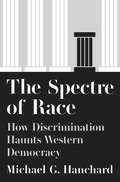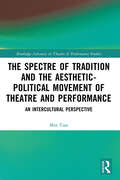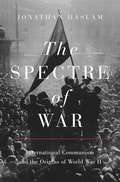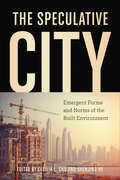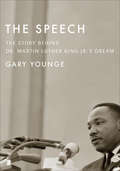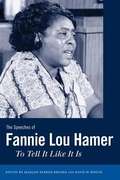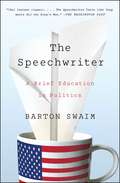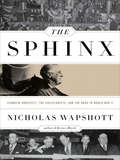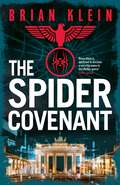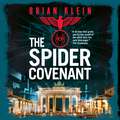- Table View
- List View
The Spectacle of U.S. Senate Campaigns
by Kim Fridkin Kahn Patrick J. KenneyThis book offers a bold, comprehensive look at how campaigns actually work, from the framing of issues to media coverage to voters' decisions. In so doing, it challenges the common wisdom that campaigns are a noisy, symbolic aspect of electoral politics, in which the outcomes are determined mainly by economic variables or presidential popularity. Campaigns, the authors argue, do matter in the political process. Examining contested U.S. Senate races between 1988 and 1992, Kim Kahn and Patrick Kenney explore the details of the candidates' strategies and messages, the content, tone, and bias of the media coverage, and the attitudes and behaviors of potential voters. Kahn and Kenney discover that when the competition between candidates is strong, political issues become clearly defined, and the voting population responds. Through a mix of survey data, content analysis, and interviews, the authors demonstrate how competition influences serious political debates in elections. Candidates take stands and compare themselves to their opponents. The news media offer more coverage of the races, presenting evaluations of the candidates' positions, critiques of their political careers, and analyses of their campaign ads. In response, the voters pay closer attention to the rhetoric of the candidates as they learn more about central campaign themes, often adjusting their own voting criteria. The book concentrates on Senate races because of the variance in campaign strategy and spending, media coverage, and voter reactions, but many of the findings apply to elections at all levels.
The Spectacular City: Violence and Performance in Urban Bolivia
by Daniel M. GoldsteinSince the Bolivian revolution in 1952, migrants have come to the city of Cochabamba, seeking opportunity and relief from rural poverty. They have settled in barrios on the city's outskirts only to find that the rights of citizens--basic rights of property and security, especially protection from crime--are not available to them. In this ethnography, Daniel M. Goldstein considers the significance of and similarities between two kinds of spectacles--street festivals and the vigilante lynching of criminals--as they are performed in the Cochabamba barrio of Villa Pagador. By examining folkloric festivals and vigilante violence within the same analytical framework, Goldstein shows how marginalized urban migrants, shut out of the city and neglected by the state, use performance to assert their national belonging and to express their grievances against the inadequacies of the state's official legal order. During the period of Goldstein's fieldwork in Villa Pagador in the mid-1990s, residents attempted to lynch several thieves and attacked the police who tried to intervene. Since that time, there have been hundreds of lynchings in the poor barrios surrounding Cochabamba. Goldstein presents the lynchings of thieves as a form of horrific performance, with elements of critique and political action that echo those of local festivals. He explores the consequences and implications of extralegal violence for human rights and the rule of law in the contemporary Andes. In rich detail, he provides an in-depth look at the development of Villa Pagador and of the larger metropolitan area of Cochabamba, illuminating a contemporary Andean city from both microethnographic and macrohistorical perspectives. Focusing on indigenous peoples' experiences of urban life and their attempts to manage their sociopolitical status within the broader context of neoliberal capitalism and political decentralization, The Spectacular City highlights the deep connections between performance, law, violence, and the state.
The Spectacular State: Culture and National Identity In Uzbekistan
by Laura L. AdamsLaura L. Adams offers unique insight into nation building in Central Asia during the post-Soviet era through an exploration of Uzbekistan's production of national culture in the 1990s. As she explains, after independence the Uzbek government maintained a monopoly over ideology, exploiting the remaining Soviet institutional and cultural legacies. The state expressed national identity through tightly controlled mass spectacles, including theatrical and musical performances. Adams focuses on these events, particularly the massive outdoor concerts the government staged on the two biggest national holidays, Navro'z, the spring equinox celebration, and Independence Day. Her analysis of the content, form, and production of these ceremonies shows how Uzbekistan's cultural and political elites engaged in a highly directed, largely successful program of nation building through culture. Adams draws on her observations and interviews conducted with artists, intellectuals, and bureaucrats involved in the production of Uzbekistan's national culture. These elites used globalized cultural forms such as Olympics-style spectacle to showcase local, national, and international aspects of official culture. While these state-sponsored extravaganzas were intended to be displays of Uzbekistan's ethnic and civic national identity, Adams found that cultural renewal in the decade after Uzbekistan's independence was not so much a rejection of Soviet power as it was a re-appropriation of Soviet methods of control and ideas about culture. The public sphere became more restricted than it had been in Soviet times, even as Soviet-era ideas about ethnic and national identity paved the way for Uzbekistan to join a more open global community.
The Spectator Book of Wit, Humour and Mischief
by Marcus BerkmannApproaching its 200th birthday in the rudest of health, the Spectator is known for the quality of its writing and the deep eccentricity of some of its writers. Given the freedom to say what they want, they take that freedom and more, and the result is original, provocative, often very funny, sometimes plain wrong. From Jeffrey Bernard's reports from the Soho frontline and Auberon Waugh fulminating about hamburger gases in the early 1990s, we encounter in turn the wild stream of consciousness of Deborah Ross's restaurant reviews, the pinpoint etiquette advice of Mary Killen, Rod Liddle's frothing but elegantly sculpted outrage and the magazine's secret weapon, low life adventurer Jeremy Clarke. This bumper selection, which also includes eminent diarists, mad letter-writers and Boris Johnson, amounts to a masterclass in comic writing, lovingly compiled and edited by Marcus Berkmann, who still can't believe he wrote a monthly pop column for the magazine for twenty-eight years without being fired.
The Specter of Babel: A Reconstruction of Political Judgment
by Michael J. ThompsonIn an age of rising groupthink, reactionary populism, social conformity, and democratic deficit, political judgment in modern society has reached a state of crisis. In The Specter of Babel, Michael J. Thompson offers a critical reconstruction of the concept of political judgment that can help resuscitate critical citizenship and democratic life. At the center of the book are two arguments. The first is that modern practical and political philosophy has made a postmetaphysical turn that is unable to guard against the effects of social power on consciousness and the deliberative powers of citizens. The second is that an alternative path toward a critical social ontology can provide a framework for a new theory of ethics and politics. This critical social ontology looks at human sociality not as mere intersubjectivity or communication, but rather as constituted by the shapes that our social-relational structures take as well as the kinds of purposes and ends toward which our social lives are organized. Only by calling these into question, Thompson boldly argues, can we once again attempt to revitalize social critique and democratic politics.
The Specter of Democracy: What Marx and Marxists Haven't Understood and Why (Columbia Themes In Philosophy, Social Criticism, and the Arts)
by Dick HowardIn this rethinking of Marxism and its blind spots, Dick Howard argues that the collapse of European communism in 1989 should not be identified with a victory for capitalism and makes possible a wholesale reevaluation of democratic politics in the U.S. and abroad. The author turns to the American and French Revolutions to uncover what was truly "revolutionary" about those events, arguing that two distinct styles of democratic life emerged, the implications of which were misinterpreted in light of the rise of communism.Howard uses a critical rereading of Marx as a theorist of democracy to offer his audience a new way to think about this political ideal. He argues that it is democracy, rather than Marxism, that is radical and revolutionary, and that Marx could have seen this but did not. In Part I, Howard explores the attraction Marxism held for intellectuals, particularly French intellectuals, and he demonstrates how the critique of totalitarianism from a Marxist viewpoint allowed these intellectuals to see the radical nature of democracy. Part II examines two hundred years of democratic political life—comparing America's experience as a democracy to that of France. Part III offers a rethinking of Marx's contribution to democratic politics. Howard concludes that Marx was attempting a "philosophy by other means," and that paradoxically, just because he was such an astute philosopher, Marx was unable to see the radical political implications of his own analyses. The philosophically justified "revolution" turns out to be the basis of an anti-politics whose end was foreshadowed by the fall of European communism in 1989.
The Specter of Dictatorship: Judicial Enabling of Presidential Power (Stanford Studies in Law and Politics)
by David M. DriesenReveals how the U.S. Supreme Court's presidentialism threatens our democracy and what to do about it. Donald Trump's presidency made many Americans wonder whether our system of checks and balances would prove robust enough to withstand an onslaught from a despotic chief executive. In The Specter of Dictatorship, David Driesen analyzes the chief executive's role in the democratic decline of Hungary, Poland, and Turkey and argues that an insufficiently constrained presidency is one of the most important systemic threats to democracy. Driesen urges the U.S. to learn from the mistakes of these failing democracies. Their experiences suggest, Driesen shows, that the Court must eschew its reliance on and expansion of the "unitary executive theory" recently endorsed by the Court and apply a less deferential approach to presidential authority, invoked to protect national security and combat emergencies, than it has in recent years. Ultimately, Driesen argues that concern about loss of democracy should play a major role in the Court's jurisprudence, because loss of democracy can prove irreversible. As autocracy spreads throughout the world, maintaining our democracy has become an urgent matter.
The Specter of Hypocrisy: Testing the Limits of Moral Discourse
by Raphael SassowerRaphael Sassower examines the concept of hypocrisy for its strategic potential as a means of personal protection and social cohesion. Given the contemporary context of post-truth, the examination of degrees or kinds of hypocrisy moves from the Greek etymology of masks worn on the theater stage to the Hebrew etymology of the color adjustment of chameleons to their environment. Canonical presuppositions about the uniformity of the mind and the relation between intention and behavior that warrant the charge of hypocrisy are critically reconsidered in order to appreciate both inherent inconsistencies in personal conduct and the different contexts where the hypocrisy appears. Sassower considers the limits of analytic moral and political discourses that at times overlook the conditions under which putative hypocritical behavior is existentially required and where compromises yield positive results. When used among friends, the charge of hypocrisy is a useful tool with which to build trust and communities.
The Spectre of Islamic Terrorism: A Machine-Generated Literature Overview
by Hussein SolomonThis book presents the result of an innovative challenge, to create a systematic literature overview driven by machine-generated content. Questions and related keywords were prepared for the machine to query, discover, collate and structure by Artificial Intelligence (AI) clustering. The AI-based approach seemed especially suitable to provide an innovative perspective as the topics are indeed both complex, interdisciplinary and multidisciplinary, for example, climate, planetary and evolution sciences. Springer Nature has published much on these topics in its journals over the years, so the challenge was for the machine to identify the most relevant content and present it in a structured way that the reader would find useful. The automatically generated literature summaries in this book are intended as a springboard to further discoverability. They are particularly useful to readers with limited time, looking to learn more about the subject quickly and especially if they are new to the topics. Springer Nature seeks to support anyone who needs a fast and effective start in their content discovery journey, from the undergraduate student exploring interdisciplinary content, to Master- or PhD-thesis developing research questions, to the practitioner seeking support materials, this book can serve as an inspiration, to name a few examples. It is important to us as a publisher to make the advances in technology easily accessible to our authors and find new ways of AI-based author services that allow human-machine interaction to generate readable, usable, collated, research content.
The Spectre of Race: How Discrimination Haunts Western Democracy
by Michael HanchardHow racism and discrimination have been central to democracies from the classical period to todayAs right-wing nationalism and authoritarian populism gain momentum across the world, liberals, and even some conservatives, worry that democratic principles are under threat. In The Spectre of Race, Michael Hanchard argues that the current rise in xenophobia and racist rhetoric is nothing new and that exclusionary policies have always been central to democratic practices since their beginnings in classical times. Contending that democracy has never been for all people, Hanchard discusses how marginalization is reinforced in modern politics, and why these contradictions need to be fully examined if the dynamics of democracy are to be truly understood.Hanchard identifies continuities of discriminatory citizenship from classical Athens to the present and looks at how democratic institutions have promoted undemocratic ideas and practices. The longest-standing modern democracies--France, Britain, and the United States—profited from slave labor, empire, and colonialism, much like their Athenian predecessor. Hanchard follows these patterns through the Enlightenment and to the states and political thinkers of the late nineteenth and early twentieth centuries, and he examines how early political scientists, including Woodrow Wilson and his contemporaries, devised what Hanchard has characterized as "racial regimes" to maintain the political and economic privileges of dominant groups at the expense of subordinated ones. Exploring how democracies reconcile political inequality and equality, Hanchard debates the thorny question of the conditions under which democracies have created and maintained barriers to political membership.Showing the ways that race, gender, nationality, and other criteria have determined a person's status in political life, The Spectre ofRace offers important historical context for how democracy generates political difference and inequality.
The Spectre of Tradition and the Aesthetic-Political Movement of Theatre and Performance: An Intercultural Perspective (Routledge Advances in Theatre & Performance Studies)
by Min TianThis book interrogates anew the phenomenon of tradition in a dialogical debate with a host of Western thinkers and critical minds. In contrast to the predominantly Western approaches, which look at traditions (Western and non-Western) from a predominantly (Western) modernist perspective, this book interrogates, from an intercultural perspective, the transnational and transcultural consecration, translation, (re)invention, and displacement of traditions (theatrical and cultural) in the aesthetic-political movement of twentieth-century theatre and performance, as exemplified in the case studies of this book. It looks at the question of traditions and modernities at the centre of this aesthetic-political space, as modernities interculturally evoke and are haunted by traditions, and as traditions are interculturally refracted, reconstituted, refunctioned, and reinvented. It also looks at the applicability of its intercultural perspective on tradition to the historical avant-garde in general, postmodern, postcolonial, and postdramatic theatre and performance and to the twentieth-century "classical" intercultural theatre and the twenty-first-century "new interculturalisms" in theatre and performance. To conclude, it looks at the future of tradition in the ecology of our globalized theatrum mundi and considers two important interrelated concepts, future tradition and intercultural tradition. This book will be of great interest to students and scholars in performance studies.
The Spectre of War: International Communism and the Origins of World War II (Princeton Studies in International History and Politics #184)
by Jonathan HaslamA bold new history showing that the fear of Communism was a major factor in the outbreak of World War IIThe Spectre of War looks at a subject we thought we knew—the roots of the Second World War—and upends our assumptions with a masterful new interpretation. Looking beyond traditional explanations based on diplomatic failures or military might, Jonathan Haslam explores the neglected thread connecting them all: the fear of Communism prevalent across continents during the interwar period. Marshalling an array of archival sources, including records from the Communist International, Haslam transforms our understanding of the deep-seated origins of World War II, its conflicts, and its legacy.Haslam offers a panoramic view of Europe and northeast Asia during the 1920s and 1930s, connecting fascism’s emergence with the impact of the 1917 Bolshevik Revolution. World War I had economically destabilized many nations, and the threat of Communist revolt loomed large in the ensuing social unrest. As Moscow supported Communist efforts in France, Spain, China, and beyond, opponents such as the British feared for the stability of their global empire, and viewed fascism as the only force standing between them and the Communist overthrow of the existing order. The appeasement and political misreading of Nazi Germany and fascist Italy that followed held back the spectre of rebellion—only to usher in the later advent of war.Illuminating ideological differences in the decades before World War II, and the continuous role of pre- and postwar Communism, The Spectre of War provides unprecedented context for one of the most momentous calamities of the twentieth century.
The Spectrum of International Institutions: An Interdisciplinary Collaboration on Global Governance
by Duncan Snidal Kenneth W. AbbottThis book collects and integrates Abbott and Snidal’s influential scholarship on indirect global governance, with a new analytical introduction that probes the role of indirect governance techniques in the universe of global governance arrangements. The volume presents the Governance Triangle, a now widely-used figure that demonstrates and helps to assess the proliferation of private and public-private standard-setting organizations, along with new forms of intergovernmental institutions, over recent decades. It then analyzes how intergovernmental organizations, regulatory bodies, and other "global governors" enlist and work through those organizations as intermediaries, so as to govern more effectively and gain knowledge, influence and legitimacy. It demonstrates Abbott’s and Snidal’s groundbreaking concept of orchestration, a mode of indirect governance in which influential governors catalyze, support, and steer intermediary organizations through wholly voluntary relationships. It also considers their more recent innovations in the theory of indirect governance. These include additional modes of governance, such as co-optation, delegation and trusteeship, as well as the pervasive "Governor’s Dilemma" trade-off between a governor’s control of its intermediaries and the intermediaries’ competence. This book will appeal to scholars and students in multiple disciplines, including international relations, global governance, law, and regulatory studies.
The Speculative City: Emergent Forms and Norms of the Built Environment
by Shenjing He Cecilia L. ChuThe Speculative City explores property speculation as a key aspect of financialization and its role in reshaping the contemporary built environment. The book offers a series of case studies that encompass a range of cities whose urban fabrics have undergone significant transformation in recent years. While the forms of these developments shared many similarities, their trajectories and social outcomes were contingent upon existing planning and policy frameworks and the historical roles assumed by the state and the private sector in housing and welfare provision. By paying close attention to the forces and actors involved in property development, this book underscores that the built environment has played an integral part in the shaping of new values and collective aspirations while facilitating the spread of financial logics in urban governance. It also shows that these dynamics represent a larger shift of politics and culture in the ongoing production of urban space and prompts reflections on future trajectories of finance-led property speculation.
The Speech: The Story Behind Dr. Martin Luther King Jr.'s Dream
by Gary YoungeIn this &“slim but powerful book,&” the award-winning journalist shares the dramatic story surrounding MLK&’s most famous speech and its importance today (Boston Globe).On August 28, 1963, Dr. Martin Luther King Jr. led the historic March on Washington for Jobs and Freedom, where he delivered the most iconic speech of the civil rights movement. In The Speech, Gary Younge explains why King&’s &“I Have a Dream&” speech maintains its powerful social relevance by sharing the dramatic story surrounding it. Today, that speech endures as a guiding light in the ongoing struggle for racial equality.Younge roots his work in personal interviews with Clarence Jones, a close friend of Martin Luther King Jr. and his draft speechwriter; with Joan Baez, a singer at the march; and with Angela Davis and other leading civil rights leaders. Younge skillfully captures the spirit of that historic day in Washington and offers a new generation of readers a critical modern analysis of why &“I Have a Dream&” remains America&’s favorite speech. &“Younge&’s meditative retrospection on [the speech&’s] significance reminds us of all the micro-moments of transformation behind the scenes—the thought and preparation, vision and revision—whose currency fed that magnificent lightning bolt in history.&” —Patricia J. Williams, legal scholar and theorist
The Speeches of Fannie Lou Hamer: To Tell It Like It Is
by Fannie Lou Hamer Maegan Parker Brooks Davis W. HouckMost people who have heard of Fannie Lou Hamer (1917-1977) are aware of the impassioned testimony that this Mississippi sharecropper and civil rights activist delivered at the 1964 Democratic National Convention. Far fewer people are familiar with the speeches Hamer delivered at the 1968 and 1972 conventions, to say nothing of addresses she gave closer to home, or with Malcolm X in Harlem, or even at the founding of the National Women's Political Caucus. Until now, dozens of Hamer's speeches have been buried in archival collections and in the basements of movement veterans. After years of combing library archives, government documents, and private collections across the country, Maegan Parker Brooks and Davis W. Houck have selected twenty-one of Hamer's most important speeches and testimonies. As the first volume to exclusively showcase Hamer's talents as an orator, this book includes speeches from the better part of her fifteen-year activist career delivered in response to occasions as distinct as a Vietnam War Moratorium Rally in Berkeley, California, and a summons to testify in a Mississippi courtroom. Brooks and Houck have coupled these heretofore unpublished speeches and testimonies with brief critical descriptions that place Hamer's words in context. The editors also include the last full-length oral history interview Hamer granted, a recent oral history interview Brooks conducted with Hamer's daughter, as well as a bibliography of additional primary and secondary sources. The Speeches of Fannie Lou Hamer demonstrates that there is still much to learn about and from this valiant black freedom movement activist.
The Speechwriter
by Barton SwaimBarton Swaim was struggling to find an academic job--he'd recently received a PhD in English--when he sent his resume to Mark Sanford, the conservative and controversial governor of South Carolina. He thought he could improve the governor's writing and speeches. On the surface, this is the story of Sanford's rise and fall. But it's really an account of what happens when a band of believers attach themselves to an ambitious narcissist. Everyone knows this kind of politician--a charismatic maverick who goes up against the system and its ways, but thinks he doesn't have to live by the rules. Swaim describes what makes people invest in their leaders, how those leaders do provide moments of inspiration, and then how they let them down.The Speechwriter is a funny and candid introduction to the world of politics, where press statements are purposefully nonsensical, grammatical errors are intentional, and better copy means more words. Through his three years in the governor's office, Swaim paints a portrait of a man so principled he'd rather sweat than use state money to pay for air conditioning, so oblivious he'd wear the same stained shirt for two weeks, so egotistical he'd belittle his staffers to make himself feel better, and so self-absorbed he never once apologized for making his administration the laughing stock of the country. In the end, it's also an account of the very human staffers who risk a life in politics out of conviction and learn to survive a broken heart.
The Spending and Absorption of Aid in PRGF Supported Programs
by Jan Kees Martijn Paolo Dudine Markus Berndt Abu ShonchoyA report from the International Monetary Fund.
The Sphinx: Franklin Roosevelt, the Isolationists, and the Road to World War II
by Nicholas WapshottBefore Pearl Harbor, before the Nazi invasion of Poland, America teetered between the desire for isolation and the threat of world war. May 1938. Franklin Delano Roosevelt--recently reelected to a second term as president--sat in the Oval Office and contemplated two possibilities: the rule of fascism overseas, and a third term. With Hitler's reach extending into Austria, and with the atrocities of World War I still fresh in the American memory, Roosevelt faced the question that would prove one of the most defining in American history: whether to once again go to war in Europe. In The Sphinx, Nicholas Wapshott recounts how an ambitious and resilient Roosevelt--nicknamed "the Sphinx" for his cunning, cryptic rapport with the press--devised and doggedly pursued a strategy to sway the American people to abandon isolationism and take up the mantle of the world's most powerful nation. Chief among Roosevelt's antagonists was his friend Joseph P. Kennedy, a stock market magnate and the patriarch of what was to become one of the nation's most storied dynasties. Kennedy's financial, political, and personal interests aligned him with a war-weary American public, and he counted among his isolationist allies no less than Walt Disney, William Randolph Hearst, and Henry Ford--prominent businessmen who believed America had no business in conflicts across the Atlantic. The ensuing battle--waged with fiery rhetoric, agile diplomacy, media sabotage, and petty political antics--would land US troops in Europe within three years, secure Roosevelt's legacy, and set a standard for American military strategy for years to come. With millions of lives--and a future paradigm of foreign intervention--hanging in the balance, The Sphinx captures a political giant at the height of his powers and an American identity crisis that continues to this day.
The Sphinx: The Life of Gladys Deacon – Duchess of Marlborough
by Hugo VickersOne of the most beautiful and brilliant women of her time, Gladys Deacon dazzled, as much as she puzzled, the glittering social circles in which she moved. Born in Paris to American parents in 1881, she suffered a traumatic childhood after her father shot her mother's lover dead. Educated in America, she returned to Europe, where she captivated and inspired some of the greatest literary and artistic names of the Belle Époque. Marcel Proust wrote of her 'I never saw a girl with such beauty, such magnificent intelligence, such goodness and charm.' Berenson considered marrying her, Rodin and Monet befriended her, Boldini painted her and Epstein sculpted her. She inspired love from diverse Dukes and Princes, and the interest of women such as the Comtesse Greffulhe and Gertrude Stein.It wasn't until she was 40 that she achieved the wish she had held since the age of 14 to marry the 9th Duke of Marlborough. Divorced from fellow American Consuelo Vanderbilt in 1921 she became his second wife. Now her circle included Lady Ottoline Morrell, Lytton Strachey and Winston Churchill, who described her as 'a strange, glittering being'. But life at Blenheim was not a success. When the Duke evicted her in 1933, the only remaining signs of Gladys were two sphinxes bearing her features on the west terraces and mysterious blue eyes in the grand portico.Gladys became a recluse. The wax injections she'd had to straighten her nose when she was 22 had by now ravaged her beauty. She was to spend her last 15 years in the psycho-geriatric ward of a mental hospital. There she was discovered by a young Hugo Vickers, who visited her for two years - intrigued and compelled to unmask the truth of her mysterious life.In his fascinating and revealing biography, drawing on Gladys's personal archive and his own research all over Europe and America, Hugo Vickers uncovers a beguiling, clever, independent woman who was the brightest star of her age. He once asked her, 'Where is Gladys Deacon?' She answered him slowly: 'Gladys Deacon? ... She never existed.'(P) 2020 Hodder & Stoughton Ltd
The Sphinx: The Life of Gladys Deacon – Duchess of Marlborough
by Hugo Vickers**The Times and Sunday Times Books of the Year 2020**'Vickers gives breathing, alarming life to a woman who puzzled and thrilled her contemporaries'SUNDAY TIMES 'Best Paperbacks of 2021''A continuously astonishing and ultimately moving account of a unique figure, the stuff of great literature' Simon Callow, SUNDAY TIMES'This biography is truly wonderful - a masterclass in storytelling'SUNDAY TIMES'The most extraordinary, rackety life' William Boyd, DAILY TELEGRAPH'Hugo Vickers's life of Gladys Marlborough is an extraordinary and tragic story, with special resonance today' EVENING STANDARD*******************One of the most beautiful and brilliant women of her time, Gladys Deacon dazzled and puzzled the glittering social circles in which she moved.Born in Paris to American parents in 1881, Gladys emerged from a traumatic childhood - her father having shot her mother's lover dead when Gladys was only eleven - to captivate and inspire some of the greatest literary and artistic names of the Belle Epoque. Marcel Proust wrote of her, 'I never saw a girl with such beauty, such magnificent intelligence, such goodness and charm.' Berenson considered marrying her, Rodin and Monet befriended her, Boldini painted her and Epstein sculpted her. In 1921, when Gladys was forty, she achieved the wish she had held since the age of fourteen to marry the 9th Duke of Marlborough, then freshly divorced from fellow American Consuelo Vanderbilt. Gladys's circle now included Lady Ottoline Morrell, Lytton Strachey and Winston Churchill, who described her as 'a strange, glittering being'. But life at Blenheim was not a success: when the Duke evicted her in 1933, the only remaining signs of Gladys were two sphinxes bearing her features on the west terraces and mysterious blue eyes in the grand portico. She became a recluse, and the wax injections she'd had to straighten her nose when she was 22 had by now ravaged her beauty. Gladys was to spend her last years in the psycho-geriatric ward of a mental hospital, where she was discovered by a young Hugo Vickers.Intrigued and compelled to unmask the truth of her mysterious life, Vickers visited her over the course of two years, eventually publishing Gladys, Duchess of Marlborough, a biography of her life - and his first book - in 1979, two years after Gladys's death. Forty years on, Vickers has now completely rewritten and revised his original biography, updating it with previously unavailable material and drawing on his own personal research all over Europe and America. The Sphinx is a fascinating portrait of this elusive but brilliant woman who was at the centre of a now bygone era of wealth and privilege - and a tribute to one of the brightest stars of her age.
The Sphinx: The Life of Gladys Deacon – Duchess of Marlborough
by Hugo Vickers**The Times and Sunday Times Books of the Year 2020**''This biography is truly wonderful - a masterclass in storytelling''Sunday Times''A continuously astonishing and ultimately moving account of a unique figure, the stuff of great literature'' Simon Callow, THE SUNDAY TIMES''Gripping . . . jaw-dropping story, brilliantly told'' Ysenda Maxtone Graham, THE TIMES''The last book that made me cry . . . a really thorough and well-researched biography'' Lynda La Plante, Good Housekeeping''The most extraordinary, rackety life'' William Boyd, DAILY TELEGRAPH''Richly anecdotal and oddly captivating'' Miranda Seymour, FINANCIAL TIMES''At the end of the book the reader can only say, "Whew! What a story!"'' Anne de Courcy, SPECTATOR''Hugo Vickers''s life of Gladys Marlborough is an extraordinary and tragic story, with special resonance today'' EVENING STANDARD*******************One of the most beautiful and brilliant women of her time, Gladys Deacon dazzled and puzzled the glittering social circles in which she moved.Born in Paris to American parents in 1881, Gladys emerged from a traumatic childhood - her father having shot her mother''s lover dead when Gladys was only eleven - to captivate and inspire some of the greatest literary and artistic names of the Belle Epoque. Marcel Proust wrote of her, ''I never saw a girl with such beauty, such magnificent intelligence, such goodness and charm.'' Berenson considered marrying her, Rodin and Monet befriended her, Boldini painted her and Epstein sculpted her. She inspired love from diverse Dukes and Princes, and the interest of women such as the Comtesse Greffulhe and Gertrude Stein.In 1921, when Gladys was forty, she achieved the wish she had held since the age of fourteen to marry the 9th Duke of Marlborough, then freshly divorced from fellow American Consuelo Vanderbilt. Gladys''s circle now included Lady Ottoline Morrell, Lytton Strachey and Winston Churchill, who described her as ''a strange, glittering being''. But life at Blenheim was not a success: when the Duke evicted her in 1933, the only remaining signs of Gladys were two sphinxes bearing her features on the west terraces and mysterious blue eyes in the grand portico. She became a recluse, and the wax injections she''d had to straighten her nose when she was 22 had by now ravaged her beauty. Gladys was to spend her last years in the psycho-geriatric ward of a mental hospital, where she was discovered by a young Hugo Vickers.Intrigued and compelled to unmask the truth of her mysterious life, Vickers visited her over the course of two years, eventually publishing Gladys, Duchess of Marlborough, a biography of her life - and his first book - in 1979, two years after Gladys''s death. Forty years on, Vickers has now completely rewritten and revised his original biography, updating it with previously unavailable material and drawing on his own personal research all over Europe and America. He once asked Gladys, ''Where is Gladys Deacon?'' She answered him slowly, ''Gladys Deacon? . . . She never existed.'' The Sphinx is a fascinating portrait of this elusive but brilliant woman who was at the centre of a now bygone era of wealth and privilege - and a tribute to one of the brightest stars of her age.
The Spider Covenant
by Brian KleinOn 10 August 1944, with Germany on the verge of a crushing and humiliating defeat, Heinrich Himmler, the second most powerful Nazi and head of the notorious SS, holds a clandestine meeting in Strasbourg, with a handful of elite industrialists and bankers.A covert organisation is born, codenamed 'Die Spinne' - The Spider. The network is tasked with helping senior SS officers escape the clutches of advancing allied forces. New identities are created, bankrolled by illicit funds, allowing notorious criminals to begin new lives in Europe and South America. Many of them land key roles in the worlds of politics, banking and industry. Decades later, they're able to pass on a privileged and influential birth right to their descendants.Himmler's secret lovechild, Amelie, is also spirited out of Germany by 'Die ,armed with a Nazi nest egg of fifty million dollars. Eighty years on, Amelie's adopted son becomes the head of the Spider network, which has evolved, survived and prospered over the decades under a cloak of secrecy.Employing a level of AI technology years ahead of anything currently known, the Spider network operates a secret facility based in Strasbourg, capable of creating undetectable Deepfakes of their own extremist politicians: perfect avatars, capable of conducting live interviews on a video stream with any news outlet in the world. The computer 'brain' of the Deepfakes is linked to state-of-the-art AI machines, programmed to create the perfect politician, spouting extreme right-wing rhetoric, aimed at winning over the masses. At a time of world disorder, with bitter wars across and the Middle East, the leaders of the Spider network look to seize their opportunity of grabbing control of the levers of political power.
The Spider Covenant
by Brian KleinOn 10 August 1944, with Germany on the verge of a crushing and humiliating defeat, Heinrich Himmler, the second most powerful Nazi and head of the notorious SS, holds a clandestine meeting in Strasbourg, with a handful of elite industrialists and bankers.A covert organisation is born, codenamed 'Die Spinne' - The Spider. The network is tasked with helping senior SS officers escape the clutches of advancing allied forces. New identities are created, bankrolled by illicit funds, allowing notorious criminals to begin new lives in Europe and South America. Many of them land key roles in the worlds of politics, banking and industry. Decades later, they're able to pass on a privileged and influential birth right to their descendants.Himmler's secret lovechild, Amelie, is also spirited out of Germany by 'Die ,armed with a Nazi nest egg of fifty million dollars. Eighty years on, Amelie's adopted son becomes the head of the Spider network, which has evolved, survived and prospered over the decades under a cloak of secrecy.Employing a level of AI technology years ahead of anything currently known, the Spider network operates a secret facility based in Strasbourg, capable of creating undetectable Deepfakes of their own extremist politicians: perfect avatars, capable of conducting live interviews on a video stream with any news outlet in the world. The computer 'brain' of the Deepfakes is linked to state-of-the-art AI machines, programmed to create the perfect politician, spouting extreme right-wing rhetoric, aimed at winning over the masses. At a time of world disorder, with bitter wars across and the Middle East, the leaders of the Spider network look to seize their opportunity of grabbing control of the levers of political power.
The Spider Covenant (The Reich Trilogy)
by Brian KleinOn 10 August 1944, with Germany on the verge of a crushing and humiliating defeat, Heinrich Himmler, the second most powerful Nazi and head of the notorious SS, holds a clandestine meeting in Strasbourg, with a handful of elite industrialists and bankers.A covert organisation is born, codenamed 'Die Spinne' - The Spider. The network is tasked with helping senior SS officers escape the clutches of advancing allied forces. New identities are created, bankrolled by illicit funds, allowing notorious criminals to begin new lives in Europe and South America. Many of them land key roles in the worlds of politics, banking and industry. Decades later, they're able to pass on a privileged and influential birth right to their descendants.Himmler's secret lovechild, Amelie, is also spirited out of Germany by 'Die ,armed with a Nazi nest egg of fifty million dollars. Eighty years on, Amelie's adopted son becomes the head of the Spider network, which has evolved, survived and prospered over the decades under a cloak of secrecy.Employing a level of AI technology years ahead of anything currently known, the Spider network operates a secret facility based in Strasbourg, capable of creating undetectable Deepfakes of their own extremist politicians: perfect avatars, capable of conducting live interviews on a video stream with any news outlet in the world. The computer 'brain' of the Deepfakes is linked to state-of-the-art AI machines, programmed to create the perfect politician, spouting extreme right-wing rhetoric, aimed at winning over the masses. At a time of world disorder, with bitter wars across and the Middle East, the leaders of the Spider network look to seize their opportunity of grabbing control of the levers of political power.

